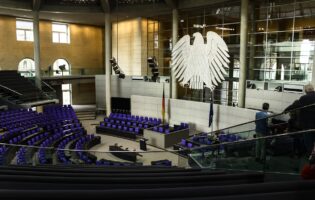Make Him Look Good!

Almut Möller
European Policy Centre
Almut Möller joined the EPC as Director for European and Global Affairs and Head of the Europe in the World programme in July 2024. She is a political scientist with professional experience in both think tanks and government. Her areas of expertise include EU institutions and politics, foreign and security policy, and multilevel governance, and she has published widely in these fields.
Prior to joining the EPC, she served as State Secretary and Plenipotentiary of the Free and Hanseatic City of Hamburg (2019-2024), representing the city state in Berlin, and at the European Union. In that capacity, she oversaw both the Berlin and Brussels representation offices and was a member of the Conference of Europe Ministers of the German Länder. She was also in charge of Hamburg's international relations, and the point of contact for the diplomatic and consular corps.
Before that, Almut was the Head of the Berlin office of the European Council on Foreign Relations (2015-2019), headed the Europe program at the German Council on Foreign Relations (2010-2015), and worked as an independent political analyst based in London (2008-2010). She started her career in think tanks as a researcher at the Centre for Applied Policy Research (C.A.P) at Ludwig-Maximilians-Universität in Munich (1999-2008).
Almut was a guest researcher at Renmin University of China in Beijing (2006), Al Ahram Center for Political and Strategic Studies in Cairo (2007), and at the American-German Institute (AGI) at Johns Hopkins University in Washington D.C. (2008).
She was a 2016-2017 participant in AICGS’ project “A German-American Dialogue of the Next Generation: Global Responsibility, Joint Engagement,” sponsored by the Transatlantik-Programm der Bundesrepublik Deutschland aus Mitteln des European Recovery Program (ERP) des Bundesministeriums für Wirtschaft und Energie (BMWi).
Europeans should play to Donald Trump’s penchant for power – against their own instincts.
How should Europe deal with Donald Trump? According to the flood of initial reactions, Europe is now facing a massive challenge and a great deal of unpredictability.
Not necessarily. Dealing and even working cooperatively with Trump might be easier than anticipated if Europeans get the basics right from the start. Here’s an example of how to get it wrong, how to get it right, and a few ideas for Europeans trying to wrap their minds around the challenge the election poses to transatlantic relations.
The presidents of the European Council and the European Commission, Donald Tusk and Jean-Claude Juncker, addressed the newly elected president in a joint letter on November 9. “We would take this opportunity to invite you to visit Europe for an EU-U.S. Summit at your earliest convenience. This conversation would allow for us to chart the course of our relations for the next four years.”
There was nothing wrong in writing that letter, but I doubt it was the best way to woo Trump to Europe. To begin with, his instincts certainly don’t lead him to embrace the European Union as an institution or as a partner. Trump is interested in power, and the EU has given him ample opportunity to associate it with powerlessness, and, perhaps worse, with the impression of a “rigged system” that he so fervently attacked in his own country during the campaign.
Trump’s attitude suggests that he believes power lies in the hands of strong men rather than with institutions, and the course of history has been shaped by deals from strong leaders, as Jeremy Shapiro argued in a recent ECFR paper. There is no reason to believe that Trump will have an interest in or even understand the post-World War II logic of various nations sharing power under the EU umbrella.
Early Mistakes
So the first mistake Tusk and Juncker made was to suggest the initial contact point should take the form of an EU-U.S. summit. For us Europeans, this is the way we operate. We believe in having everyone around the table, regardless of size and prowess. But this certainly won’t impress Trump. The second mistake the presidents made was to leave the timing to President Trump: “at your earliest convenience.” It gives the impression that Europeans are fawning and needy, keen for the U.S. president to give them a bit of his precious time.
So how can Europe do better in piquing Trump’s interest and making his cooperation more likely? Fundamentally, Europeans should play to his penchant for power, even if it goes against their own instincts, and they should clearly be the ones to set the agenda and timing. Furthermore, Trump is a newcomer in the world of international politics, and being the narcissist he is, he wants to succeed.
So Europeans should help introduce him to the international arena and make him look good in the club, as long as it doesn’t hurt them. The most important thing is for Europeans to impress President Trump with how they work and cooperate as Europeans, and with others, around one table. Europeans should therefore orchestrate the best opportunities to show their own strengths. They should utilize the various resources they have in playing old-fashioned power politics, which has seen a resurgence in Europe and the world. We can play this game of power by putting our strongest leaders out front, but we must also show the added value of the union’s institutional machinery.
A prime example is the EU3+3 in negotiations with Iran: The High Representative and the EU’s most influential countries played a pivotal role in shaping those talks. President-elect Trump will push Europeans to perform better in other areas where they can marry the strength of member states and EU institutions.
Two events will be important benchmarks in that process. As of December 1, Germany will take over the G20 presidency from China. In the run-up to the summit in Hamburg in July 2017, there will be a host of meetings between officials on various levels. European members of the G20, including EU representatives, should use these talks as an opportunity to coordinate and liaise with their U.S. counterparts in the new Trump administration so they can build alliances at working levels. At the summit itself, Europeans should make an extra effort to show unity, and the German presidency can help a great deal in portraying a Europe in motion.
Italy will hold the G7 presidency in 2017, and this will present another important opportunity. The next meeting will be held in Sicily next May (though it’s a bit ironic to imagine President Trump in this setting). The overall subject is migration, a topic that has been hugely divisive in Europe, and will likely also be a major point of discord with Trump, going by his campaign rhetoric. However, this is not necessarily an impediment to a successful display of European unity and strength, precisely because we have got to know so well each other’s domestic limitations. There is a strong interest in the EU to internationalize the challenge of migration, and Europeans should naturally be looking for points of convergence. This might be the chance.
Yes, Europeans are facing a great deal of unpredictability with President Trump. But if they manage to get the fundamentals right, they might be able to turn it into an opportunity for Europe itself.
This article was first published by Berlin Policy Journal.









